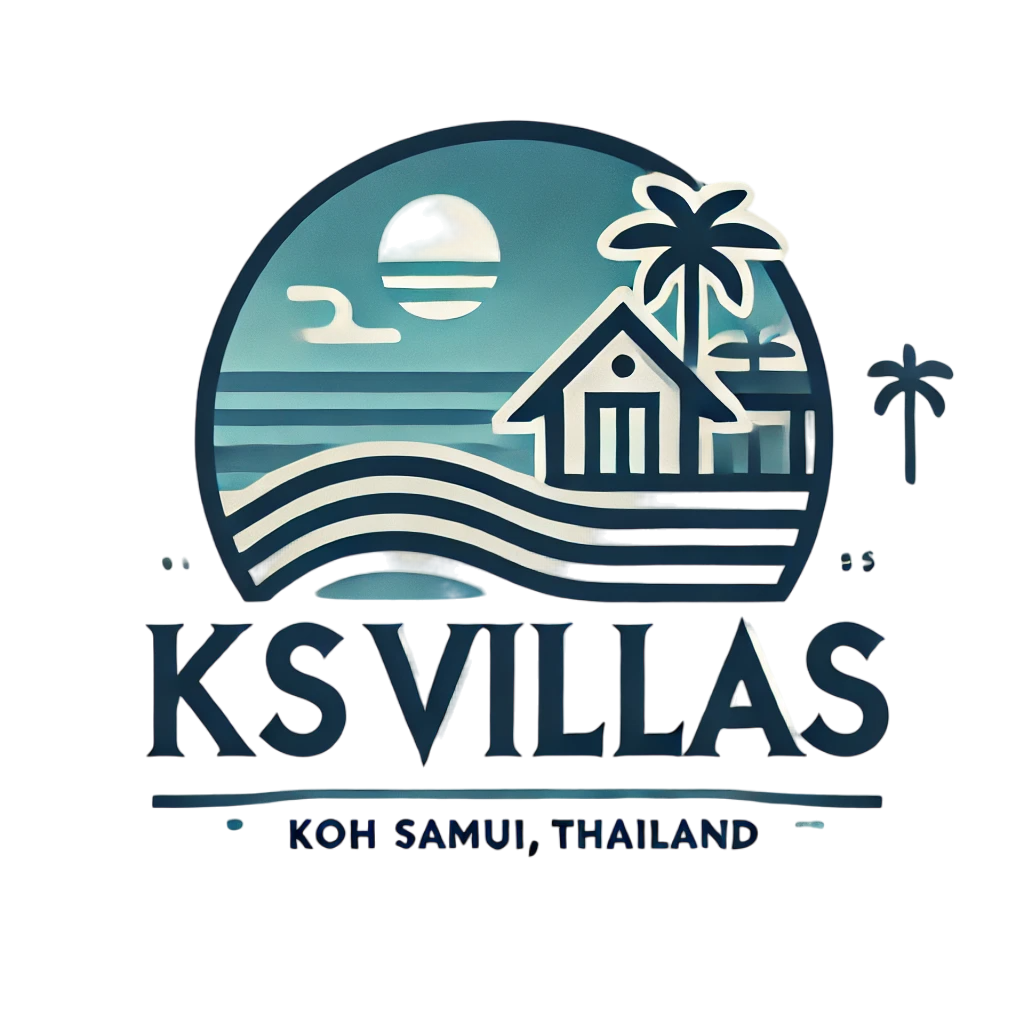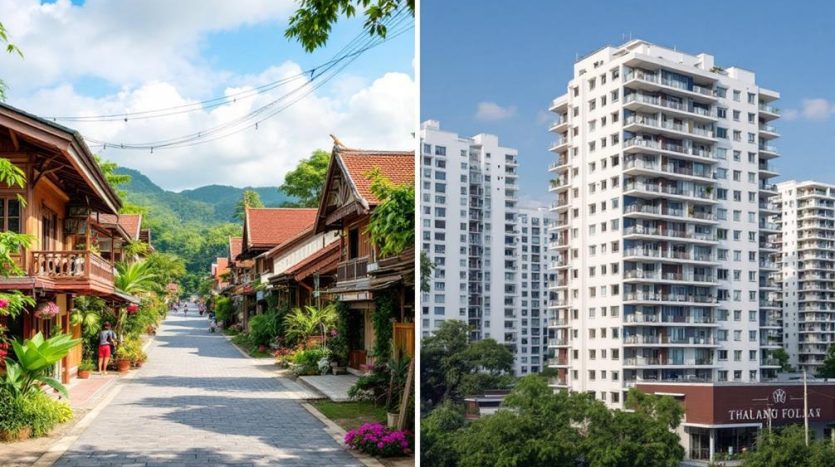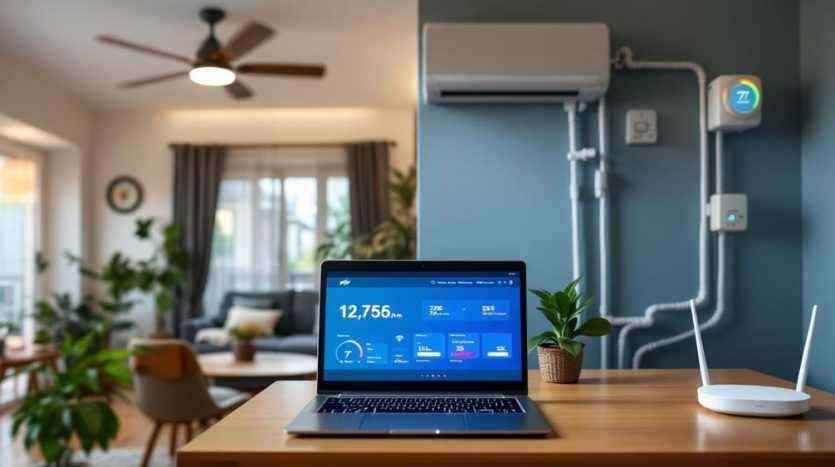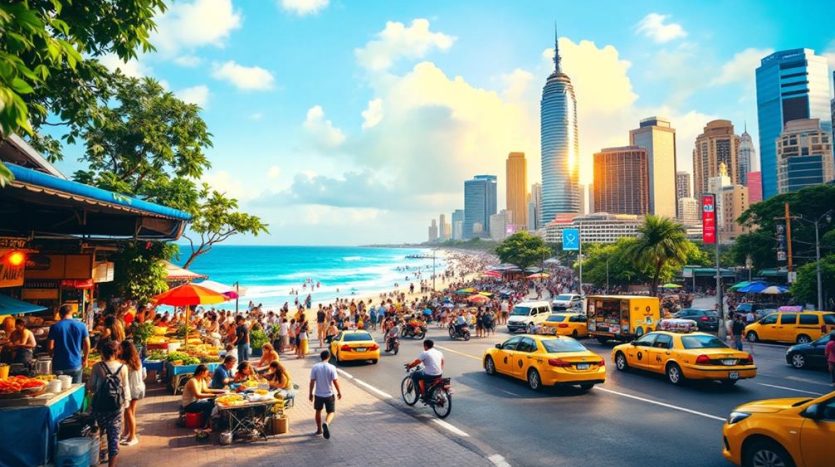Is It Cheaper to Live in Thailand Than Us?
When you consider relocating, the cost of living is often a top concern. You've probably heard that living in Thailand is cheaper than in the U.S., but how substantial are these savings really? Housing, food, and healthcare costs are often cited as more affordable in Thailand, potentially allowing you to stretch your budget further. But what about the quality of life and hidden expenses you might not initially consider? These factors can tip the scales in unexpected ways. So, how do the numbers really stack up, and is the lifestyle compromise worth the cost savings?
Key Takeaways
- Thailand's housing costs are significantly lower, with a one-bedroom apartment averaging $500 compared to $1,600 in the U.S.
- Dining out in Thailand is up to 70% cheaper than in the U.S., with affordable street food options.
- Public transportation in Thailand is much more economical, with fares starting at around $0.30.
- Healthcare expenses in Thailand are budget-friendly, with doctor's visits costing $10 to $30.
- Utility and internet bills in Thailand are notably more affordable than in the U.S.
Housing Costs Comparison
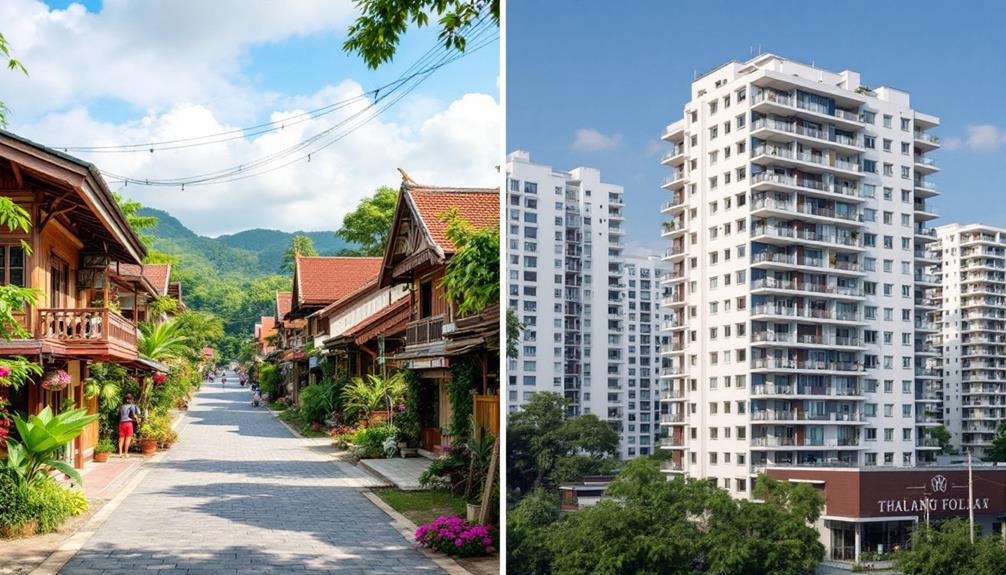
When comparing housing costs between Thailand and the U.S., you'll often find that Thailand offers considerably more affordable options. In a country where the housing market operates on a different scale, you might feel like you've entered an alternate universe where your wallet takes a breather.
Data suggests that the average monthly rent in Thailand for a one-bedroom apartment in the city center is around $500. In contrast, that same space in a U.S. city could cost you upwards of $1,600. If you're doing the math, that's enough savings to finally justify that avocado toast habit.
Thailand's rental trends show a stable yet flexible market, offering expats and locals alike a variety of choices. Whether you're into high-rise condos or charming countryside homes, the options are as diverse as a buffet line at a comedy club.
Additionally, foreigners, such as Americans renting property in Thailand, can benefit from a fair rental process and tenant rights. Meanwhile, U.S. rental trends seem to have taken a page out of an action movie script, with prices continually skyrocketing.
It's not just about the numbers, though. The lower housing costs in Thailand allow for a lifestyle that includes more than just paying bills, like perhaps affording a gym membership to work off all that extra avocado toast.
Food and Dining Expenses
When considering food and dining expenses, you'll find that Thailand often offers lower prices compared to the US.
Data indicates that local market prices in Thailand are generally more affordable, with staples like rice and produce costing considerably less.
Additionally, street food isn't only delicious but also a budget-friendly option for residents, making it a staple in daily life.
Dining out is cost-effective, as meals at local restaurants can be up to 70% cheaper than similar meals in the US.
Local Market Prices
In Thailand, local market prices for food and dining are frequently lower than those in the United States, making it a more affordable option for many. Street food isn't just a quick meal—it's an experience. You'll pay less for a delicious pad thai than you'd for a small coffee in the States. With market freshness at its peak, local produce is both abundant and cheap. Forget about the limp lettuce from your grocery store; here, vegetables have the crispness of a stand-up comedian.
Bargaining tips are essential—imagine it as a sport where winning means paying less for traditional goods. Just remember, don't haggle over a few baht; it's like trying to squeeze juice from a rock.
Artisan crafts add a splash of culture to your shopping cart. Whether you're after a handwoven scarf or a carved wooden elephant, the prices are as attractive as the items themselves.
Seasonal variations can be your wallet's best friend. When mangoes are in season, they're practically giving them away. Embrace local shopping customs by bringing your own bag, and you might just fit in like a local—minus the language skills.
Dining Out Costs
How much are you really spending when dining out in Thailand compared to the U.S.? If you've ever had a hankering for street food, you're in luck—grabbing a savory pad Thai from a food stall in Bangkok might set you back just $1.50.
Contrast that with a New York City food truck where you'll drop around $8 for a gourmet hot dog. That's some culinary diversity for your wallet!
In terms of fine dining, a three-course meal for two in Thailand's finest restaurants costs about $50. In the U.S., you're looking at around $80 for a similar experience.
The restaurant atmosphere in Thailand often blends local charm with a touch of elegance, and don't forget the dining etiquette—no shoes on the cushions, please!
Food markets in Thailand offer a smorgasbord of local cuisine, where dishes like green curry can be an expat favorite, costing just a few dollars.
Meanwhile, in America, you might pay twice as much for a similar dish in a food court.
Ultimately, whether you're traversing bustling food markets or enjoying fine dining, Thailand offers a wallet-friendly adventure for your taste buds. Bon appétit, savvy traveler!
Transportation and Commute
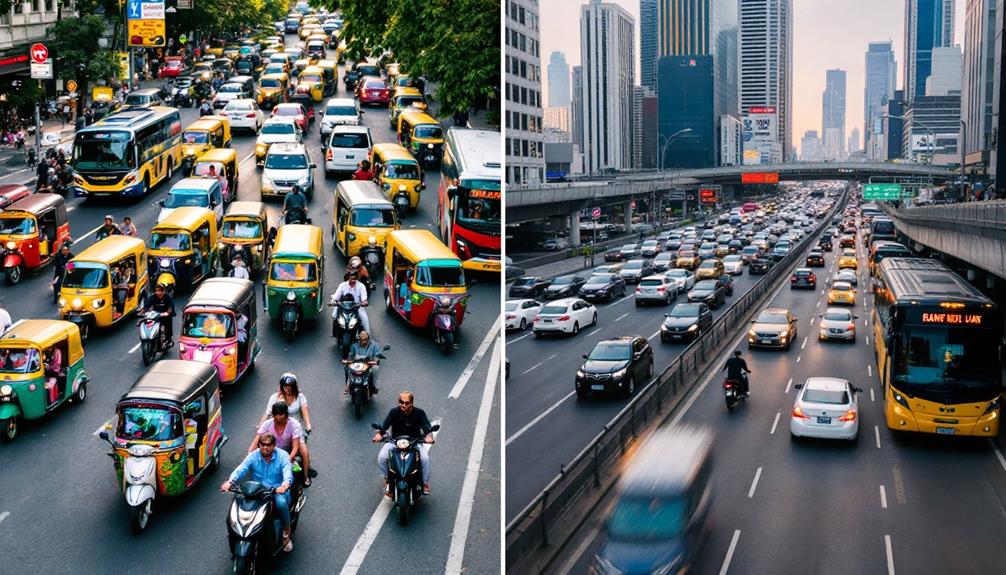
Maneuvering Thailand's transportation system reveals a notable cost advantage over the United States. Public transport in Thailand isn't only a wallet-friendly alternative but a cultural journey. Bangkok's sky train and metro offer fares starting at a mere $0.30, making U.S. metro fares feel like a splurge.
Foreigners considering investments in Thailand find the affordable transportation system an added benefit, complementing the attractive property options like condominiums in popular areas. Ride sharing apps like Grab are widely used and surprisingly affordable, though traffic conditions can test your patience more than a toddler with a sugar high.
Commuting habits in Thailand lean heavily toward two wheels, with bike rentals available for as low as $1 a day—ideal for anyone wanting to channel their inner Tour de Thailand.
Taxi services in Thailand are abundant and, unlike your last Tinder date, actually show up when they say they will. Costs are low, but make sure the meter's on or you might end up paying more than your therapist's hourly rate.
Fuel costs are also noticeably cheaper, lightening the wallet burden if you're driving. However, travel time during rush hour might require meditation or a podcast binge to maintain sanity.
Healthcare and Insurance
While maneuvering the cost-effective transportation options in Thailand, you'll find similar financial relief in the domain of healthcare and insurance. Thailand offers robust healthcare access, making it a haven for both locals and expats. You can enjoy modern medical facilities with advanced technology, which are often praised in expat experiences. The insurance options are vast and cater to different needs. Let's face it, even in paradise, you might slip on a banana peel, so having emergency services that won't break the bank is essential.
| Healthcare Component | Cost in Thailand (USD) |
|---|---|
| Doctor's Visit | $10 – $30 |
| Health Insurance | $300 – $1,000 annually |
| Prescription Meds | Up to 70% cheaper |
Preventive care is affordable, allowing you to keep your health in check without sacrificing your vacation fund. Wellness alternatives are abundant too, from yoga to herbal remedies, adding a fun twist to staying fit. Pharmaceutical costs are considerably lower, ensuring your wallet doesn't suffer when you need that extra-strength ibuprofen. Overall, Thailand's healthcare and insurance landscape is a budget-friendly option for those seeking quality care without the hefty price tag. Just remember, a little planning goes a long way in staying healthy in the Land of Smiles.
Utility and Internet Bills
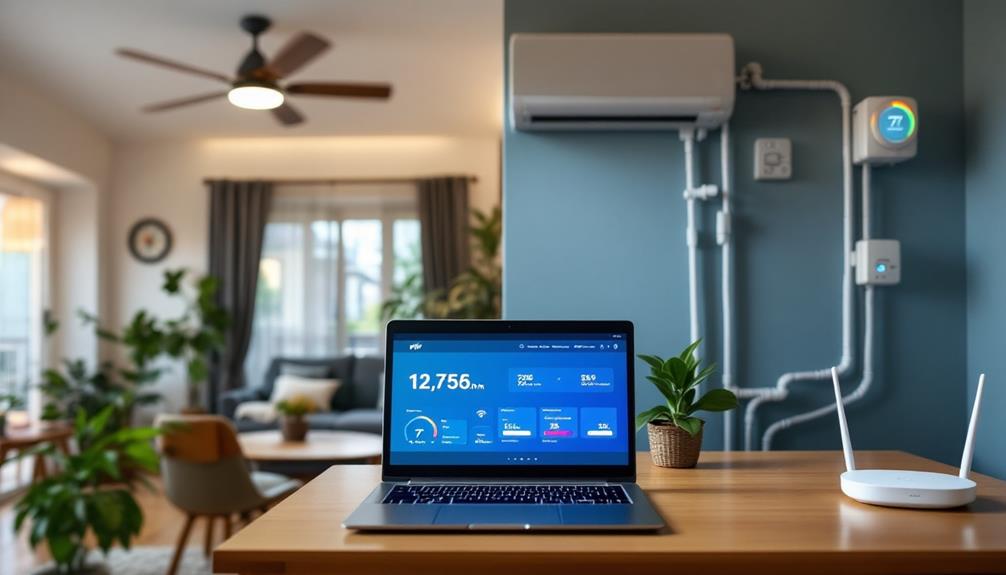
Maneuvering the financial landscape of utilities and internet bills in Thailand can reveal considerable savings compared to the U.S. Utility providers in Thailand charge markedly less, a fact that might make you believe you've slipped into a parallel universe where bills are friendly and polite.
Electricity costs, for instance, usually range around 3-4 Thai Baht per kWh. Imagine your wallet doing a happy dance because that's about 9 to 12 cents per kWh! In contrast, the U.S. averages about 15 cents per kWh.
And water bills? They're so low, they could join the Cirque du Soleil. The affordability of utilities is one of the many reasons why rural properties in Thailand offer great value for money, making them an attractive option for expatriates and retirees.
When it comes to internet options, Thailand offers competitive pricing that's as appealing as a free buffet. You can snag high-speed fiber internet for as little as 600 Baht per month, roughly translating to a mere $17.
Meanwhile, in the U.S., you might need to cough up around $60 for similar speeds. You'll enjoy reliable service, too; Thailand's network usually ranks well in internet speed tests.
Entertainment and Leisure
When evaluating entertainment and leisure costs, you'll find significant differences between Thailand and the US.
Local recreation in Thailand often comes at a fraction of the price compared to the US, with affordable options for nightlife and cultural events.
Data indicates that a night out in Thailand can be up to 50% cheaper, and tickets for cultural events are generally more economical, making Thailand an attractive option for budget-conscious individuals seeking leisure activities.
Local Recreation Costs
In considering local recreation costs, Thailand often presents a more affordable landscape compared to the US.
Let's break it down with some data-driven insights, where you might find yourself chuckling at the disparities.
- Local Sports & Community Activities: While you might be shelling out significant sums to join a community soccer league in the US, Thailand offers local sports at a fraction of the price. You can play, sweat, and score goals without sweating over costs.
- Outdoor Adventures & Fitness Options: Hiking in Thailand's lush landscapes or joining a fitness class won't cost you an arm and a leg. In contrast, US-based fitness options might leave you wondering if you should've chosen a career in personal training just to afford them.
- Wellness Programs & Recreational Facilities: Wellness programs in Thailand, like yoga retreats or spa days, are budget-friendly. Comparatively, in the US, you might need a wellness program just to recover from the bill shock.
- Cultural Festivals & Hobby Classes: Thailand brims with cultural festivals and hobby classes that are light on your wallet. Meanwhile, in the US, your hobby might just become budgeting for your next hobby class.
In essence, Thailand offers a cost-effective playground where your cash goes further.
Nightlife Affordability
Exploring the nightlife in Thailand often proves to be far more affordable than in the US. When you immerse yourself in Thailand's bar culture, you'll find that a night out is less likely to drain your wallet.
The average cost of a cocktail in a Thai bar hovers around $3, while in the US, it can easily exceed $10. Beer enthusiasts? You're in luck. A bottle of local beer in Thailand costs about $1.50, compared to $5 or more in the US. It's like your wallet's on a permanent vacation!
But let's not forget nightlife safety, an essential part of the equation. Thailand's bustling streets and vibrant venues are generally safe, though, like anywhere, staying alert and aware is key.
Many bars and clubs employ security personnel, and the local police often patrol popular nightlife areas, adding an extra layer of safety.
Cultural Event Pricing
Considering cultural event pricing in Thailand compared to the US, you'll find significant cost differences that favor the budget-conscious traveler.
Let's crunch some numbers and see where your wallet would rather vacation.
1. Festivals Pricing: In Thailand, attending the iconic Songkran Festival might set you back around $50 for a full day of water-soaked fun, while a comparable event in the US, like Mardi Gras in New Orleans, could cost upwards of $200. Your wallet's already packing sunscreen.
2. Cultural Experiences: Visiting a traditional Thai dance show can cost as little as $10.
Meanwhile, catching a Broadway show in New York City could lighten your pockets by $100 or more. That's a lot of Pad Thai for the price of a musical.
3. Museum Entry Fees: Explore the history at Bangkok's National Museum for around $6.
In contrast, a ticket to the Smithsonian in Washington D.C. is free, but don't get too smug—your plane ticket wasn't.
4. Cooking Classes: Learn to make authentic Thai cuisine for $30 in Chiang Mai.
Stateside, a similar experience might cost you $100. Who knew tom yum soup came with a side of savings?
Education and Childcare

When evaluating the costs associated with education and childcare, many find that Thailand offers a more affordable landscape compared to the United States. International schools in Thailand are often the go-to for expat communities, providing a curriculum that eases cultural integration. However, tuition fees can still vary widely. While some schools could make your wallet weep, many offer competitive rates that make you wonder if they misplaced a decimal point.
| Aspect | Thailand |
|---|---|
| International School Fees | $5,000 – $25,000 |
| Childcare Options | $200 – $600/month |
| Homeschooling Trends | Increasing |
| Language Barriers | Moderate |
Childcare options in Thailand are diverse, ranging from local daycares to international nannies. The costs are generally lower, making it easier to find quality care without breaking the bank. Speaking of banks, the educational quality varies, but many international schools offer a level of education on par with Western standards, all while teaching your kids to say "sawadee ka" like a pro. Language barriers can be a challenge, but with a little patience and a sense of humor, cultural integration becomes an enriching experience. Homeschooling trends are also on the rise, allowing for more flexible and personalized education.
